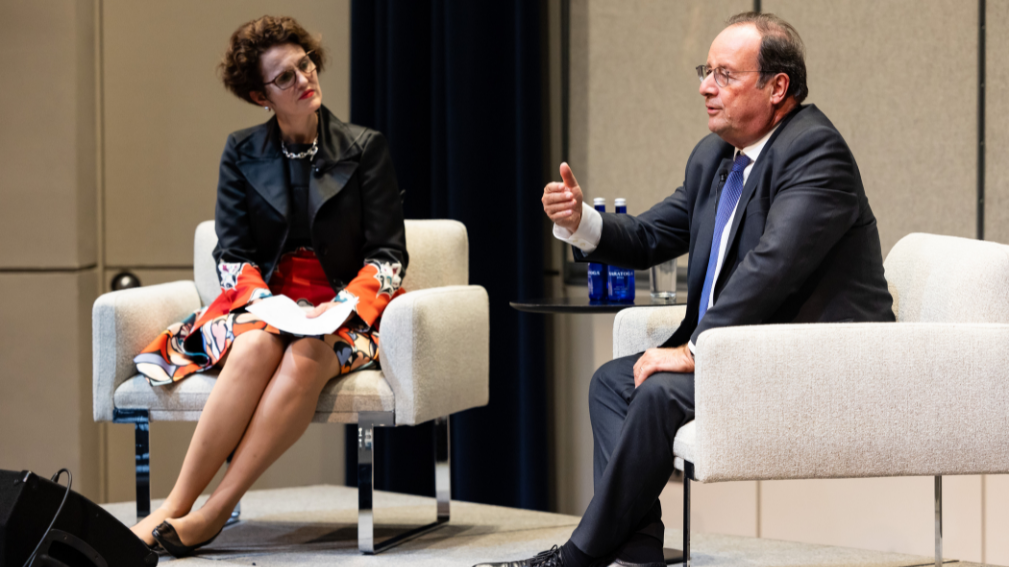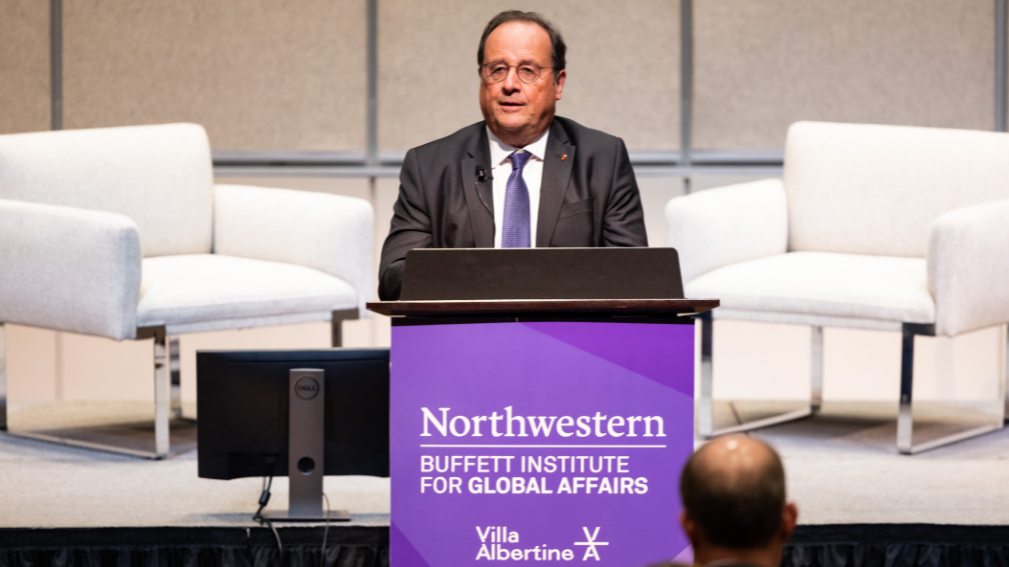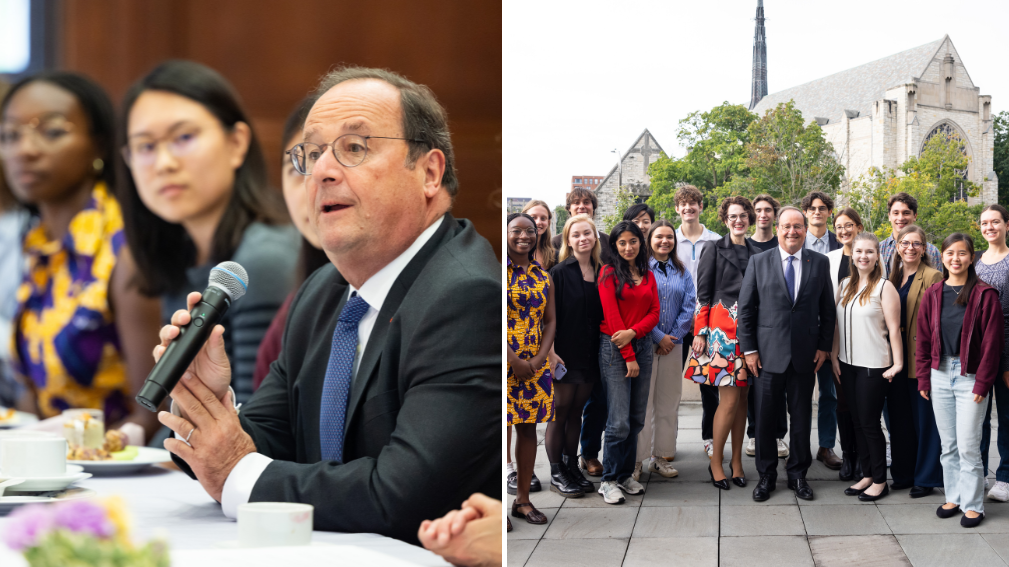Former French President François Hollande Delivers Northwestern Buffett Lecture
The 24th President of France shared his perspective on global affairs and the role of young people in empowering civil society.

Photo credit: Justin Barbin Photography
François Hollande, the 24th President of France, last week visited Chicago and Evanston where he engaged the Northwestern University community in discussions on the upheavals that have led to today’s new world order and strategies for fostering global peace. Co-hosted by the Northwestern Roberta Buffett Institute for Global Affairs and Villa Albertine, former President Hollande also delivered a public Buffett Lecture in Global Affairs delving into the challenges and opportunities of coordinating multilateral action during global crises and sharing his perspective on progress made toward peace and prosperity.
The former head of France’s Socialist Party, Hollande served the country from 2012 to 2017. His time in office saw the legalization of same-sex marriage and the 2015 United Nations Climate Conference (COP21), which gave rise to the Paris Agreement’s instrumental goals to reduce greenhouse gas emissions. Since leaving office, Hollande has published three books on politics and international relations, including his latest, Bouleversements, which analyzes international relations through the lens of shifting balances of power and examines threats to democracy and its role in sustaining global peace and justice.
“All generations since the end of World War II went through crises, through conflict, through catastrophes. But for the past ten years, there has been an accumulation of upheavals,” said Hollande. “A generation that has known so many crises is overwhelmed, of course. This leads us to ask ourselves questions about the capacity of democracy, of our political systems to resist so many catastrophes, crises, conflict and fears that are obviously triggered by so many events. We need to know what is most resilient: democracy or authoritarian regimes?”

France’s former President François Hollande delivers his Northwestern Buffett Lecture on Upheavals: Understanding the New Global Order.
Hollande also touched on polarization, drawing parallels between the rise of populist nationalism in France and the United States. “Populist rhetoric is fed...by fear, by rejection of change. That's why in France, the far-right party—which is right now the largest party in our national assembly—has made the decision not to talk...if you're a populist, you don't need to say anything. Because if you do, then you have to propose something concrete,” said Hollande. “What's needed is a political party that listens to the people but is also able to elicit hope and inspire some sort of collective ambition. This populist wave is undoubtedly going to reach its cusp. But it must come down at some point. Otherwise, democracy will take a real hit.”
In conversation with Annelise Riles, Executive Director of Northwestern Buffett and Associate Provost for Global Affairs at Northwestern University, Hollande answered questions and shed further light on insights gained through his tenure as France’s president. “The aim of the Northwestern Buffett Lecture is to honor significant global leaders for their contributions to peace and justice internationally and provide a forum for critical analysis of global affairs,” said Riles. “We couldn’t imagine anyone better to shed light on the challenges and opportunities associated with coordinating multilateral action to achieve shared global goals.”
Eight years ago, Hollande championed the launch of United Nations (UN) Sustainable Development Goals—calling them one of the UN’s most decisive steps toward ensuring the collective well-being of people and the planet. On climate change, he remarked, “It is easy to be pessimistic because we are faced with something very serious. But there are encouraging elements as well. We want to make fossil fuel cars disappear by 2035. We want to decarbonize the economy. We want to make our construction and production more sustainable. Europe is progressing and can set an example for the rest of the world.”
Before Thursday’s lecture, Hollande discussed current events with a group of undergraduate students in Northwestern’s International Studies Program at the Weinberg College of Arts & Sciences. He encouraged students to think about their education through a global lens and stressed the role of universities in addressing global social inequalities through international education. “However, it's important to note that such programs can sometimes widen the gap between a very globalized youth and a youth who do not have the same opportunities,” said Hollande. “To foster a genuine sense of unity, we must promote initiatives that cater to everyone, including students from disadvantaged backgrounds. This means creating global university partnerships that ensure fair access to international education so that everyone can contribute to building a common future.”

Former President Hollande engages undergraduates in Northwestern University’s International Studies Program in a discussion on global affairs, international education and the critical role of young people in civil society.
Throughout the discussion and his Northwestern Buffett Lecture, Hollande emphasized the role of young people in civil society and ensuring democracy works for everyone. “It’s important to make this known to the younger generations. Democracy is not a given, and it’s not eternal. It’s easy to think that it’s the political system that represents progress and human development and the values of pluralism and freedom and virtue,” said Hollande in conversation with Riles during the lecture. “And yet, what’s happening today? We are in a situation in which democracy really deserves to have its own combatants. Otherwise, it’s going to get tired.” Watch the full lecture and discussion on YouTube.
